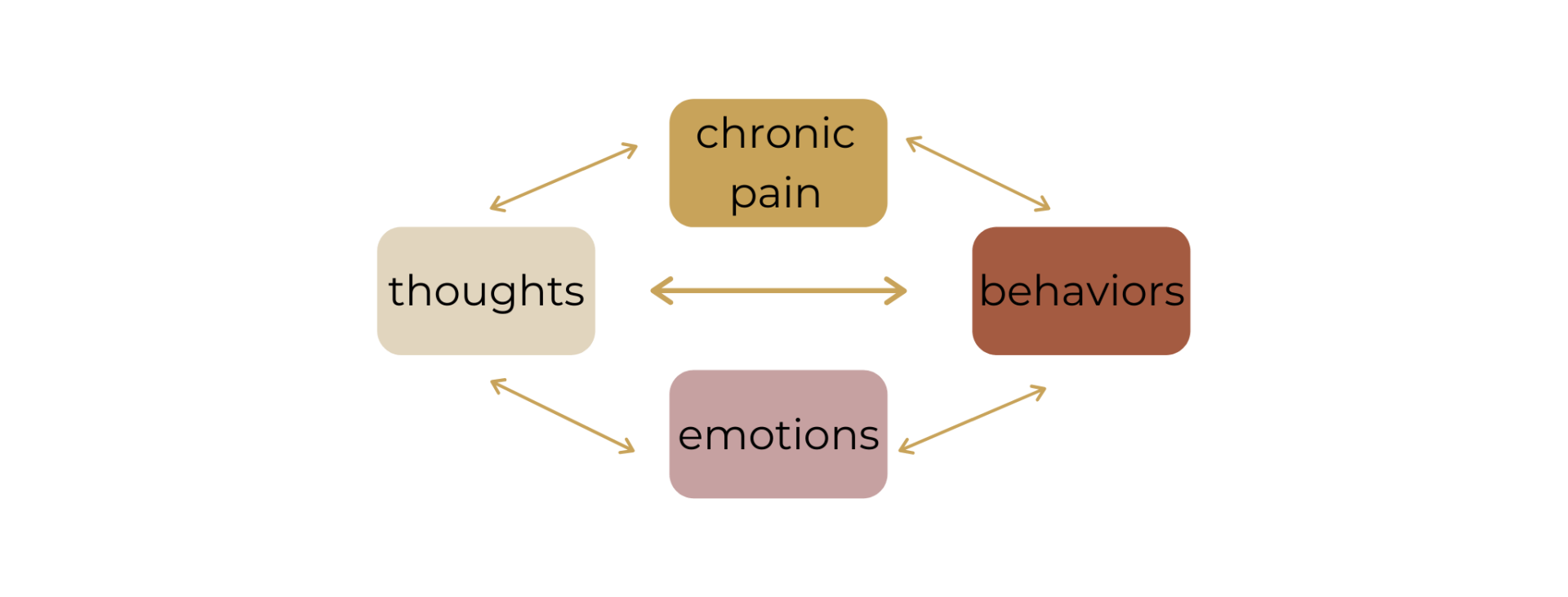Cognitive Behavioral Therapy (CBT) for chronic pain
Schedule a free 15-min consultation
Living with chronic pain
“I can’t do any of the things that matter to me.”
“I’ll never get better.”
“My chronic pain is too much for my friends and family to handle.”
“The pain is only going to get worse.”
“There’s nothing I can do to deal with the pain.”
Pain often affects the way you think about yourself, others, the future, and even your relationships. And if you’re living with chronic pain, some of the thoughts listed above may sound familiar.
Chronic pain can also impact your mood. Chronic pain and depression are highly comorbid. Anxiety is also commonly reported in those with chronic pain. You may feel sad or resentful about the many ways in which pain is disrupting your life, or feel anxious about how your future goals may be affected. You may also experience fear about experiencing a pain flare-up or engaging in certain activities. Even activities that you used to do on autopilot can now cause feelings of anxiety. In turn, negative emotions and stress can exacerbate your perception of pain, making you feel that there is no way out of that uncomfortable state.
Your day-to-day functioning may also be disrupted. As pain fluctuates, it may get in the way of your ability to work or participate in activities that you enjoy, such as hobbies, exercise, or spending time with loved ones and family. Over time, many describe that managing pain feels like a full-time job, leaving then with little energy to do the things that matter to them or make them feel like themselves.
How CBT for chronic pain can help you
Cognitive Behavioral Therapy (CBT) for chronic pain can provide some support to improve your day-to-day functioning and overall quality of life by learning new, more helpful ways to respond to your pain. It has been showed to be help across a variety of pain conditions (e.g., back pain, fibromyalgia, IBS).
CBT is a form of therapy that is structured, fairly short-term, and focuses on the present.
CBT targets cognitions (it’s the "C" in CBT )
First, you will learn to become more aware of your cognitions or automatic thoughts (those thoughts that often run through your mind without you necessarily noticing) and assess how helpful and/or true they are. Thoughts are not facts! And CBT will give you the skills to replace negative, unhelpful thoughts with more helpful ones. This technique, which is commonly referred to as cognitive restructuring is different from “thinking positive” or “finding the silver lining.” Instead, it teaches you a way to change your thoughts and think more objectively about stressful situations and develop a more adapted self-talk. It won’t happen overnight, but with time, you will become more aware of your thoughts patterns and you will learn to respond to your symptoms in a more flexible way.
For instance, “This pain flare-up is too much, I can’t handle it.” can become “I’m in a lot of pain. It’s tough and I don’t like it, but I’ve felt this way before and I know it will get better. I can focus on managing the pain one minute/hour at a time.”
In time, the CBT techniques you learn may also allow you to re-assess some of your deeply held negative core beliefs about yourself, the world, and relationships.
CBT targets behaviors (it's the "B" in CBT)
CBT can also help you engage in healthier or more helpful behaviors to better manage pain in your day-to-day life and improve functioning. Together, we’ll look at the behaviors you engage in and figure out whether they are helpful or not to manage your pain. We know for instance that overdoing it, or, on the contrary, avoiding activity altogether, can increase your pain. Activity pacing is an important component of CBT for chronic pain and can help you increase your day-to-day functioning as you figure out an activity-rest cycle that works best for you. CBT also helps you identify activities and behaviors that can help improve your mood. Relaxation training is also an essential part of CBT interventions, allowing you to alleviate muscular tension.
CBT gives you the tools to better manage pain. When you feel like pain is bossing you around, CBT helps you reclaim a sense of confidence in your ability to better respond to your symptoms and take steps towards doing the things that matter to you, in a way that respects your functional limitations.
In a nutshell, CBT interventions can help with:
- Increasing your day-to-day functioning
- Increasing self-efficacy
- Improving overall quality of life
Looking for a CBT therapist in Miami?
If you live in the Miami and are interested in working with a therapist trained in CBT for chronic pain, let’s chat! While there are no “easy fix” or simple solutions, therapy can help if you are willing to take part at the best of your abilities. Treatment offers a venue to learn CBT skills and techniques to become more confident in your ability to manage pain, (re)connect with yourself and others, and get back into a life that is more than your symptoms.
Online CBT is also available
Treatment is available online to all Florida residents. You can receive support and learn CBT techniques and tools from the comfort of your own home, saving you some time and energy.
If you are ready to get started with therapy or want to learn more about services, give me a call at 305-988-0560 today, or send me a message through the contact form.
Join my list & receive ideas and reminders to live a life that is more than your diagnosis!
Mailchimp sign up
Thank you for signing up!
Please try again later
All Rights Reserved | Dr. Lucette


